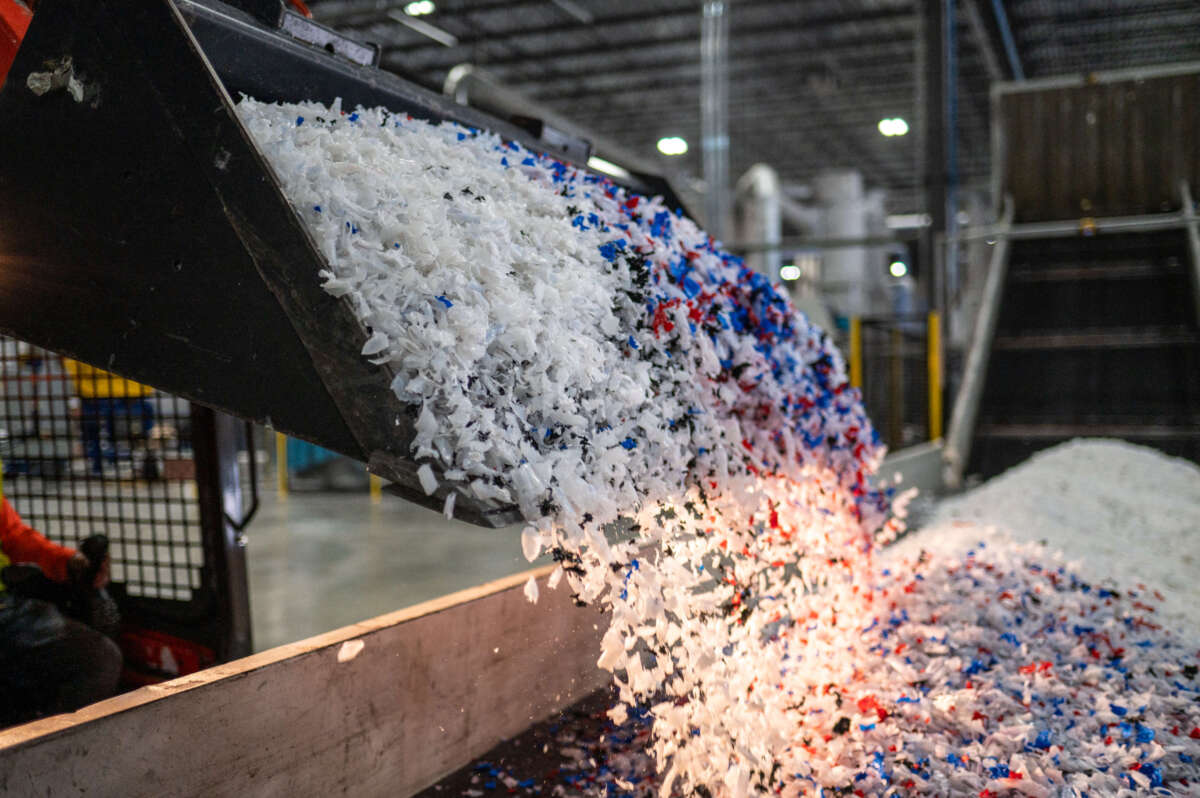~~ recommended by collectivist action ~~
The fossil fuel giant spent decades spreading propaganda that recycling could solve the plastic waste crisis.

The global fossil fuel giant ExxonMobil took out a 12-page editorial advertisement in Time magazine back in 1989 titled “The Urgent Need to Recycle.” The ad called on readers to imagine recycled plastic material used in idyllic ways – the material for a dock, for example, or the carpet in a young couple’s first home — painting recycling technology as a smart solution to plastic waste. A trade group funded by the company had already been promoting the now ubiquitous “chasing arrows” recycling symbol, which remains totally unregulated and promotes myths about recycling to this day.
The “advertorial” in Time launched decades of corporate propaganda aimed at convincing consumers that excessive use of plastic food packaging is not a problem as long as people choose to recycle. Since then, plastic waste has become a global environmental crisis. Scientists find harmful “microplastics” everywhere, from the depths of the ocean to our own internal organs. Debates over whether sorting the recycling bin is worth the effort rage in kitchens everywhere.
Now, California Attorney General Rob Bonta has filed a landmark lawsuit against ExxonMobil for “deceiving” the public about the recyclability of plastic products and exacerbating the plastic pollution crisis. In a statement on Monday, Bonta’s office said ExxonMobil has spent decades promoting the false idea that all plastics are recyclable, when in reality, most single-use plastic products will likely not be recycled due to technological and economic limitations.
“For decades, ExxonMobil has been deceiving the public to convince us that plastic recycling could solve the plastic waste and pollution crisis when they clearly knew this wasn’t possible,” Bonta said in a statement. “ExxonMobil lied to further its record-breaking profits at the expense of our planet and possibly jeopardizing our health.”
ExxonMobil is the world’s top producer of virgin polymers, the petrochemical building blocks of plastic used by other companies to make throwaway products, such as single-use water bottles and grocery bags. Despite the widespread embrace of recycling by consumers, only about 5 to 6 percent U.S. plastic waste is recycled, and the national recycling rate has never exceeded 9.5 percent. Meanwhile, plastic waste has exploded since the 1980s.
Globally, only about 9 percent of plastic waste is successfully recycled. The rest is incinerated, stuffed into landfills, or dumped into the environment. At least 22 percent of plastic waste is “mismanaged,” one reason why plastic trash is accumulating into massive vortexes of garbage floating in the Pacific Ocean.
A recent study out of New Zealand estimates that 170 trillion pieces of plastic have contaminated the world’s oceans. Such material can break down into microplastic bits small enough to enter the bloodstream of both animals and humans; scientists now say we all have microplastics inside our bodies.
Filed in the San Francisco County Superior Court, the lawsuit lays the plastic waste crisis at the feet of ExxonMobil, a titan of the oil and gas industry that is already notorious for lying to the public for decades about the dangers of climate change. Polymers and plastics are made by processing fracked gas and other fossil fuels at petrochemical plants, and as climate change pushes wealthier nations toward renewable sources of energy, the industry views growing demand for throwaway plastics as critical for maintaining profits into the future.
Environmental groups applauded the lawsuit. Julie Teel Simmonds, senior counsel in the Oceans program at the Center for Biological Diversity, said Attorney General Bonta is taking the “logical step” for holding corporate polluters accountable.
“Every corner of the world is infiltrated by plastic pollution and we’re all carrying microplastics in our bodies,” Simmonds said in an email. “Only bold actions like those of Attorney General Bonta can stop Big Oil and the plastics industry from telling lies to keep making harmful products we don’t need.”
Most recently, ExxonMobil has promoted “advanced recycling,” which breaks down plastic waste at the molecular level to make petrochemical products, such as fuels and lubricants. “Advanced recycling is a real, proven solution that can help address plastic waste and improve recycling rates,” ExxonMobil told NPR in a statement earlier this year.
But Bonta and environmentalists call it another publicity stunt meant to fool consumers. A report released by environmental researchers in 2023 found that “advanced recycling” is actually a form of chemical recycling that has a history of producing large amounts of hazardous waste. Chemical recycling cannot handle large amounts of plastic food packaging and rarely results in old plastic being turned into new plastic. Various fuels to be burned are produced instead.
“Chemical recycling isn’t new, it has not worked for decades, and the few facilities that are operating are hurting the planet and people, particularly low-income communities and communities of color,” said Judith Enck, president of Beyond Plastics, when the report was released last year.
Bonta said he is asking the court to order ExxonMobil to put “billions of dollars” into an abatement fund that will pay for plastic waste cleanup in California. ExxonMobil could also face civil penalties and pay fines under the state’s environmental laws, which are some of the strictest in the nation.
No comments:
Post a Comment